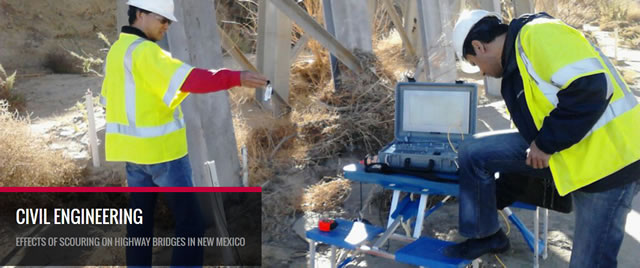
Civil Engineering ETDs
Publication Date
2-14-2014
Abstract
Resilient modulus (MR) of soils is well-accepted and essential parameter for structural design of flexible pavements using the Mechanistic Empirical Pavement Design Guide (MEPDG). A comprehensive laboratory study is undertaken to evaluate the moisture, suction effects and durability performance on resilient modulus (MR) and unconfined compressive strength (UCS) of lime treated clayey subgrade soils. Two subgrade soils: the AASHTO class A-6 and A-7-6 are collected from US 491 road site in New Mexico. Cylindrical soil specimens are prepared according to NCHRP 1-28A at three lime percentages: 0%, 5% and 7% which are selected based on pH test. MR tests on lime treated soils are conducted with a modified stress sequence incorporated in the AASHTO T 307 procedure based on past literature and laboratory experience gained in this study. However, MR test is performed on the untreated soils following the AASHTO T 307 stress sequences for subgrade soils. Test samples are prepared at three different molding moisture contents: optimum moisture content (OMC), dry state (OMC-2%) and wet state (OMC+2%). It is shown that the effects of moisture on MR and UCS values of lime treated soils are less than those on untreated soils. Test results reveal that MR and UCS values increase due to lime treatment depending on soil type and lime dose. A filter paper method is used to directly determine the total and matric suctions of soils at different moisture states in this study. It is observed that all suction components (total, matric and osmotic) increase due to lime addition on untreated subgrade soils. Test results show approximately 15% increase of osmotic suction proportion to total suction after lime treatment to untreated soils. Finally, an existing MR constitutive model is revised by incorporating total suction. The revised model is shown to have better predictive capability over existing traditional stress-dependent resilient modulus models. For durability study, samples are prepared at optimum water content and tested after subjected to 10 and 20 freeze-thaw (F-T) cycles in a controlled environmental chamber. MR and UCS results of F-T samples are compared with no F-T damage samples. It is seen that resilient modulus values of untreated soils reduces significantly (>80%) after 20 F-T cycles. Lime stabilization shows less than 35% reduction in MR values due to F-T action, thus exhibit less damage than untreated soils. In addition, field saturation state is simulated in the laboratory to observe the worst wetting condition of a pavement during the service life. Untreated soaked samples collapse completely; whereas lime stabilized soils maintain integrity with no significant change in modulus values due to soaking.
Keywords
Resilient Modulus, Soil Suctions, Lime Stabilization, Freeze-Thaw
Sponsors
New Mexico Department of Transportation
Document Type
Thesis
Language
English
Degree Name
Civil Engineering
Level of Degree
Masters
Department Name
Civil Engineering
First Committee Member (Chair)
Ng, Tang-Tat
Second Committee Member
Maji, Arup
Recommended Citation
Rahman, Md Tahmidur. "Evaluation of Moisture, Suction Effects and Durability Performance of Lime Stabilized Clayey Subgrade Soils." (2014). https://digitalrepository.unm.edu/ce_etds/90
